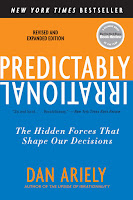Dan Ariely is a behavioral economist who has studied the way that individuals behave in the world. Whether we look at our markets or the dating world, you name it, at some point Dan has probably done a study on it or can refer you to the work of one of his colleagues, explaining with great detail how we are sometimes predictably irrational. The work of economists like Ariely helps us to understand how people behave under certain circumstances, particularly ones that effect our wallets. Through gaining deeper understandings of how humans behave when faced with different incentives and asymmetries in information, we equip ourselves with the best tools to make decisions that optimize efficiency on both, the behalfs of producers, and consumers. Businesses and individuals who understand behavioral economics are at a clear advantage in the market place because they are able to manipulate the way consumers behave to a large degree.
Now, obviously there are simple incentives that send clear signals to individuals in life and the market place, but Arielys real gift to economics can be seen when directs us to look at how people behave under circumstances that do not give clear incentives or signals. One of the examples Ariely provides in his book "Predictably Irrational" demonstrates cases in which individuals behave irrationally in the masses. He explains the power comparisons options has on the behalf of the consumer or individuals dealt with various propositions.
Don't dismiss this first example I'm about to discuss because confusing Ariely's book for a scientific journal of a sociopath would be a mistake; what Ariely finds holds relevance later when we look at how consumers make purchasing decisions. First he explains comparisons that individuals make when it comes to picking a partner. Studies discussed in his book explain that individuals who are accompanied by comparatively less attractive friends appear significantly more attractive to prospective partners. This discussion brings him back to what he initially set out to find; can trends in how we compare the attractiveness of prospective partners extend into our markets? You bet they do.
Ariely goes on to explain the concept of a "decoy" in the context of the market place, specifically in pricing. He talks about a popular magazine company called "The Economist" who used a very interesting marketing strategy that surely increased profits for the company.
In this situation there are three options. "The Economist" want's to sell a product at a price that maximises what consumers will be willing to spend. the options are to buy the magazine subscription, the online subscription, or the magazine and online subscriptions combined. In this case we would call the print subscription option the "decoy" because on comparison the option to buy the combined subscription appears to be more valuable than the option to buy the print only subscription given that they are priced the same while one option provides more mediums of content than the other. Having the print only option price to compare to the print and web combined option illustrates that the combined option is more valuable. When we look at the web only option we don't have another purchasing option to compare it with. Given all of this it is thought in theory that a consumer would be most inclined to purchase the third option, just like an individual may pick the person who is relatively the most attractive person in the room to be their partner. When we compare options in our lives we are only able to asses value relative to what is presented to us. Here, "The Economist" sells the profit maximizing duel subscription that they want to sell more of.
Dan Ariely's work and the work of many other economists alike are the keys to unlocking marketing strategies that get consumers to behave in a ways that are preferable and the work also can help consumers be aware of the sellers intent.




No comments:
Post a Comment